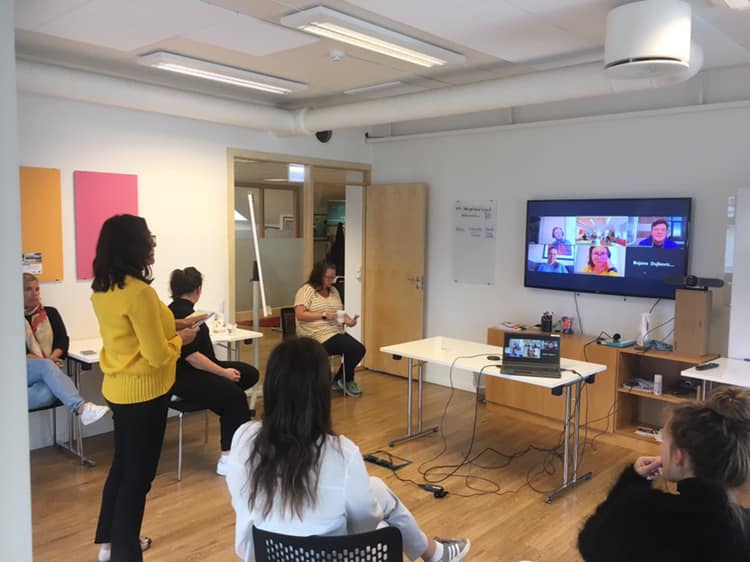The European Wergeland Centre is a learning centre and in the context of Covid-19 this has become truer than ever. Emerging issues rising from the pandemic gives increased relevance to education for democracy, human rights and intercultural understanding. The centre explores new ways of working with focus on digital learning and new platforms, a process that started before the pandemic, but that has been intensified because of it.

This is not just true for EWC, but also for the schools, teachers, and students the centre works with. Everyone has almost overnight been obliged to go online and learn how to teach and learn via new tools. For EWC, face-to-face activities has traditionally been at the core of our activities, now the centre explores more hybrid ways of working.
“This is not about digitalizing face-to-face. It is rather about testing models of e-learning and its pedagogies, for instance interactive pedagogy, which means learning through democracy and human rights, which is the engine in what we do. It is also very relevant for involving parents, who became key supporters for the teachers during the pandemic”, EWC Executive Director Ana Perona-Fjeldstad, says.
This fall EWC is establishing a working group that will explore different options and possibilities. The group will identify which elements of the centre’s work that are suitable to move online and which needs to stay face-to-face. It will also have to look at the structure of the projects; some may incorporate more online elements than others depending on for example the type of participants and objectives.
During the pandemic, EWC has seen that the model of the whole school approach has become extremely relevant. The whole school approach is where the school does not stop in the classroom or the school yard, but involves the home, parents and the whole community. An OECD survey shows that 75% of authorities says that the home-school cooperation is key to be able to provide quality education to the students in the time of the pandemic.
“We see that the schools we have been working with for a long time, that had structures for cooperation and involvement of parents in place before the pandemic, reacted quicker and had a transparent flow of communication which lead to better coping with the situation,” Perona-Fjeldstad, says. A similar trend can be seen at schools that have been working on developing a democratic school culture. Schools which had been working with EWC for more than 18 months when the pandemic started had a completely different dynamic than schools which had just joined EWC programmes. They were characterized by in a higher degree of common understanding and trust between leadership, personnel and students. They were simply more ready to manage a crisis like Covid-19.
An important task for EWC in the months and years to come will be to show how such methods from education for democratic citizenship and human rights education (EDC/HRE) are relevant to deal with the new challenges posed by the pandemic and other crisis. EWC will therefore highlight certain topics which are particularly relevant as a response to the issues emerging from the crisis of Covid-19.
One such issue is the effect the pandemic has had on particularly vulnerable and marginalized groups like Roma, children from remote communities and migrant children. It has exacerbated structural inequalities, and children without strong school support from their home, who do not have access to internet or a computer outside of school or only access to one device that is used by parents for work are especially at risk. “They may be left behind in a situation where schools digitalize, and students have to learn more based on online solutions. Our job is to work with teachers, make them aware and able to see those that are at risk of dropping out. As a European organization, we can help share experiences, good practices and lessons learned. We can bring people together, offline and online, to discuss and learn on how to find the best solutions”, Perona-Fjeldstad, says.
Another pressing concern for young people, and according to a recent OECD survey even more important than jobs and education, is mental health. EWC will have to investigate how teachers dealing with the wellbeing of the students can be supported better in the time to come.
“EWC, even though we are a small organization, can bring these issues into the schools and universities – raise the issue of the need to work together to find solutions in the classrooms across Europe, bring awareness to why it is so important to cope and find solutions together. Discuss how, in some countries, human rights might be under pressure when governments are using the crisis to increase the level of surveillance on their populations, while decreasing the level of protection for minorities or the opposition – issues that are happening across the world related to the pandemic. When it comes to education professionals, we can contribute by incorporating these very relevant issues into our trainings – raising awareness and providing tools and methods supporting them to do their job, giving democracy and human rights issues a concrete meaning in students’ everyday life” Perona-Fjeldstad concludes.